multiversalexports
130 posts
Science Fiction Art, Games & Design by Rick Scott
Don't wanna be here? Send us removal request.
Text
Beginners Guide to Sabacc Oracles

The Beginner's Guide to Sabacc Oracles collects the complete run of designs for a Sabacc Oracle or fortune-telling deck as published on the Multiversal Exports design blog, a fan production based on the lore as presented in the Lando Calrissian Adventures and other EU/New Canon sources.

DOWNLOAD NOW
ABOUT
The first official appearance of Sabacc in this EU book series (outside of a brief reference in a Marvel comic issue) presented the game as a poker/blackjack-like game which used a 78-card deck structure derived from a Rider-Waite Tarot deck. In the novel, Lando explains that the Sabacc deck can also be used to tell fortunes, and performs a reading following the procedural model for a Celtic cross Tarot spread. The novel also introduces a handful of cards whose names and meanings are variations on their Tarot counterparts.
Later iterations on the game and deck in official canon tended not to develop the tarot connection, to the extent that when a playable deck was invented for Sabacc, it was structured around the limited number of cards mentioned in the novel, with occasional references to other cards dropped piecemeal in other EU material.
The Beginner's Guide to Sabacc Oracles presents a full adaption of the original Rider-Waite deck for the Star Wars Universe. Within the lore, the 78 card deck has been labelled the 'Centran Sabacc' deck to distinguish it from the 76-card deck which became common in the rest of the EU. Since I envision the provenance of the fortune-telling version of Sabacc to be much wider than the Centran locale, with many different possible versions and localisations, I refer to the 78-card deck as a 'Sabacc Oracle Deck'.
While fans have presented their own interpretations of this deck before, they have focused almost solely on translating the cards of the Major Arcana to the Star Wars setting. This Guide, as far as I'm aware, is the first to present a full translation of the four suits (the Minor Arcana) to the Star Wars setting, including card identities, meanings and designs.
The Guide includes sections on the history of the Sabacc deck and it's use as an Oracle, it's place in philosophical beliefs about the Force, and basic procedures and practices for its use in line with this lore. It includes the concept of card alignments and using 'Oracle Dice' to determine whether the cards are favourable or negative to replace the happenstance of dealing reversed or upside down cards.
Use the Beginner's Guide to Sabacc Oracles to integrate this piece of Star Wars lore fully into your next RPG session, fan fiction or cosplay/bounding experience!
FUTURE DEVELOPMENTS
Future updates planned for this project include: Opportunities to access physical and digital versions of the Oracle deck, new Oracle deck versions, and expanded and updated guides that expand on how to read the cards, their meanings, and ways to incoporate them directly into RPG sessions.
#star wars art#star wars design#star wars reference#star wars fanart#star wars lore#star wars#sabacc#swrpg#star wars concept art#maytheforcebewithyou
1 note
·
View note
Text
How Do Credits Work in Star Wars: Skeleton Crew? What we’ve learned so far…

What has Skeleton Crew added to the lore of Star Wars currency so far?
Quite a bit!
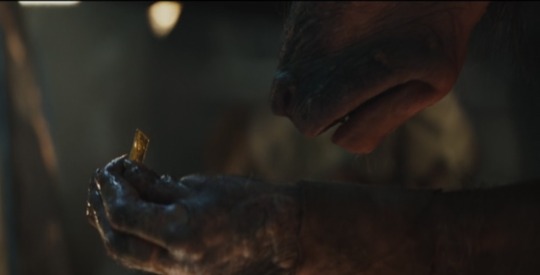
At the opening of the show, a pirate crew boards a Republic-aligned freighter, and cracks its heavily shielded vault, only to find a single credit-piece inside. 'A single measly credit' the Devaronian sneers. Technically, it's 50 measly credits, if the Aurebesh numerals on the New Republic credit coins are to be believed - but Jude Law's 'Crimson Jack' doesn't try to argue the point!
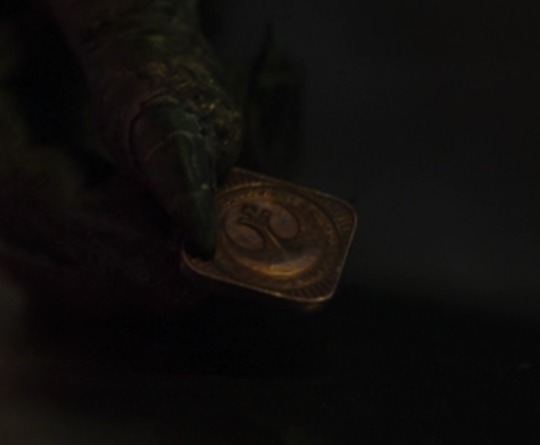
From the first trailer, we glimpsed a new type of credit - an 'Old Republic Credit'. In the context of the trailer, many assumed these would be part of a hidden bullion or treasure trove that the kids stumble upon, and that 'Old Republic' might have referred to an era well before the time of even the Prequel films. But as the show has unfolded, we've learned that these credits were handed to Wim by his father in Episode 1 - as his lunch money!
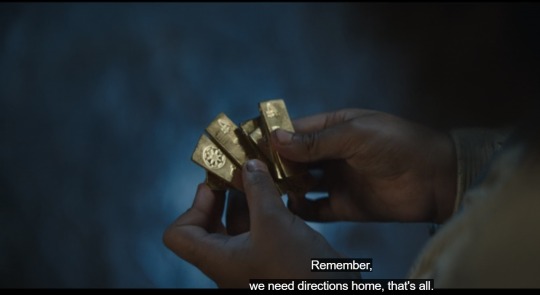
In Episode II, Wim hides them in his socks and refers to them as 'dataries' - a term for credits used in The Phantom Menace, and pretty rarely used since. Dataries doesn't seem to be the name by which citizens in the Imperial or New Republic era refer to their credits.
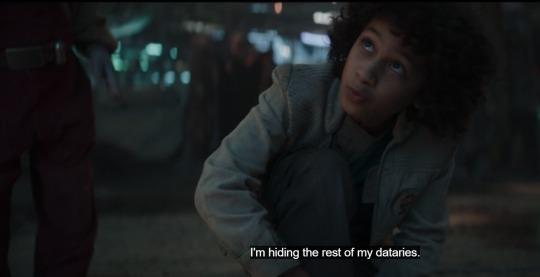
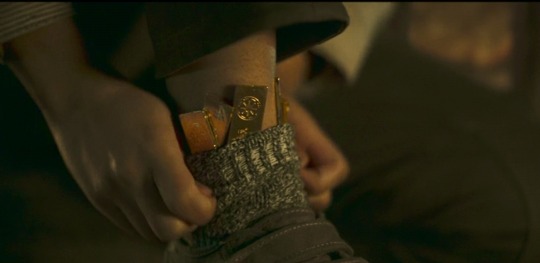
These dataries later caught the excited attention of the denizens of the pirate star port, who wanted to know where he had found 'mint' condition Old Republic credits.
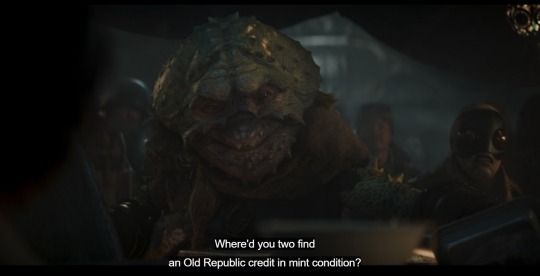
There's even a suggestion that dataries might have some significance to the mystery of the kid's home-planet, At-Attin, and why it has been purposefully hidden from the rest of the galaxy: is the techno-bureaucratic nature of its society and it's enigmatic 'Great Work' possibly linked to wealth and finance, which has reached the rest of the galaxy as a distorted legend that the planet hides a hoard of treasure?
But it's the scene where Wim flashes his dataries at the street food vendor which brings the most interesting new wrinkle to credit lore, for me anyway. Before flashing the cash, the vendor tells him 'That'll be two decs. ' Wim is confused. 'Two decs,' the vendor repeats. 'Credits?'
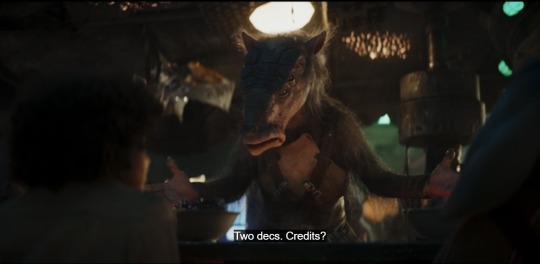
So what is a 'dec'? There are two likely possibilities. The first is that a 'Dec' is the name for a recognised currency in that era; perhaps the currency in use by the New Republic. A 'Dec' could be the contemporary equivalent of the 'Datary', with which Wim is more familiar.
The other possibility - and the one which I prefer! - is that a 'dec' is a quantity of credits; more than that, it is probably a recognised unit of currency that is commonly traded in. A 'dec' sounds like it ought to be a unit of 10 credits, based on the Latin prefix 'deca' meaning ten - which gives us words like decade, decalogue, decameron, etc. Two 'decs' would therefor equal 20 credits, making the cost of a meal at the vendor 10 credits a head.
I like this idea because it fits in with another bit of credit terminology that has come up in the past - the 'decicred'. A 'decicred' has been used to explain Anakin Skywalker's use of the word 'dime' in the Clone Wars. If there are currency tokens for parts of a credit known as 'decicreds', it makes sense for there be larger denominations that are multi-credit coins--like a 'dec', or a 'decacred'.
I'm particularly delighted by them dropping a 'dec' as a probably currency unit because I've been working on a conceptual system of credit denominations that could be used to structure the (rarely defined) values of the different types of credits that we see across the Star Wars media. Starting from the idea of the 'decicredit', my scheme proposes a ladder of values that stretches from 1/100 of a credit - a 'centicred' - up to a credit, and from there, to multicredit pieces, starting which a dicredit, pentacred and - yep! - a decacred.

After that, the values keep climbing, through values of 20, 25 and 50 to 100, 200, 250 and 500. The highest credits pieces, some of the larger bars we see traded, are valued from 1000 to 10,000 credits.

After those, I've appended some alternate names for the crystal currency pieces that also make a recurring appearance - the 'crystal vertex' coins that trace their lore origins back to Brian Daley's Han Solo trilogy and the West End Games sourcebooks.

#star wars art#star wars design#star wars reference#star wars lore#star wars roleplay#star wars#skeleton crew
1 note
·
View note
Text
Naboo Royal Classic #12 - The Astris

#star wars art#star wars design#star wars fanart#star wars reference#star wars lore#star wars roleplay#sabacc#star wars#maytheforcebewithyou#starwars#star wars concept art#star wars content
4 notes
·
View notes
Text
Naboo Royal Classic #11 - The Evil One

#star wars art#star wars design#star wars lore#star wars reference#star wars fanart#star wars roleplay#sabacc#star wars#maytheforcebewithyou#star wars concept art#star wars content
2 notes
·
View notes
Text
Naboo Royal Classic #10 - The Virtue of Moderation

#star wars art#star wars reference#star wars design#star wars fanart#star wars roleplay#star wars lore#sabacc#star wars#maytheforcebewithyou#star wars concept art#star wars content
4 notes
·
View notes
Text
Naboo Royal Classic #9 - The Demise

#star wars art#star wars design#star wars fanart#star wars reference#star wars lore#star wars roleplay#sabacc#star wars#maytheforcebewithyou#starwars#star wars concept art#star wars content
3 notes
·
View notes
Text
Naboo Royal Classic #8 - The Cosmic Balance (-11)

#star wars art#star wars design#star wars reference#star wars fanart#star wars lore#star wars roleplay#sabacc#star wars#maytheforcebewithyou#star wars concept art#star wars content
2 notes
·
View notes
Text
Naboo Royal Classic #7 - The Virtue of Endurance (-8)

#star wars art#star wars design#star wars fanart#star wars reference#star wars lore#star wars roleplay#sabacc#star wars#maytheforcebewithyou#star wars concept art#star wars content
2 notes
·
View notes
Text
Naboo Royal Classic #6 - The Queen of Air & Darkness (-2)

#star wars art#star wars design#star wars reference#star wars fanart#star wars roleplay#star wars lore#sabacc#star wars#maytheforcebewithyou#starwars#star wars content#star wars concept art
2 notes
·
View notes
Text
Naboo Royal Classic #5 - The Fool (0)

#star wars art#star wars design#star wars reference#star wars fanart#star wars lore#star wars roleplay#star wars#sabacc#maytheforcebewithyou#starwars#star wars concept art#star wars content
4 notes
·
View notes
Text
Naboo Royal Classic #5 - Suit of Coins

#star wars art#star wars reference#star wars design#star wars fanart#star wars roleplay#star wars lore#sabacc#star wars#maytheforcebewithyou#star wars concept art#star wars content
6 notes
·
View notes
Text
Naboo Royal Classic #4 - Suit of Blades

#star wars art#star wars design#star wars fanart#star wars reference#star wars lore#star wars roleplay#sabacc#star wars#maytheforcebewithyou#star wars concept art#star wars content
3 notes
·
View notes
Text
Naboo Royal Classic #3 - Suit of Staves

#star wars art#star wars design#star wars reference#star wars fanart#star wars lore#star wars roleplay#sabacc#star wars#maytheforcebewithyou#star wars concept art#star wars content
4 notes
·
View notes
Text
Naboo Royal Classic #2 - Suit of Flasks

#star wars art#star wars reference#star wars design#star wars fanart#star wars roleplay#star wars lore#sabacc#star wars#maytheforcebewithyou#star wars concept art#star wars content
9 notes
·
View notes
Text
Naboo Royal Classic #1 - Royal Deck

#star wars art#star wars design#star wars reference#star wars fanart#star wars roleplay#star wars lore#sabacc#star wars#maytheforcebewithyou#star wars concept art#star wars content
3 notes
·
View notes
Text
Sabacc Oracle Reading #2 - Lando's Oracle Reading (Updated)
Lando sees the Bogan (Rokur Gepta) again before he draws the Universe.

#star wars art#star wars design#star wars reference#star wars fanart#star wars lore#star wars roleplay#sabacc#maytheforcebewithyou#star wars concept art#star wars content
2 notes
·
View notes
Text
Sabacc Oracle Cards #78 - 21. The Universe

#star wars art#star wars design#star wars fanart#star wars reference#star wars lore#star wars roleplay#sabacc#star wars#maytheforcebewithyou#star wars concept art#star wars content
3 notes
·
View notes